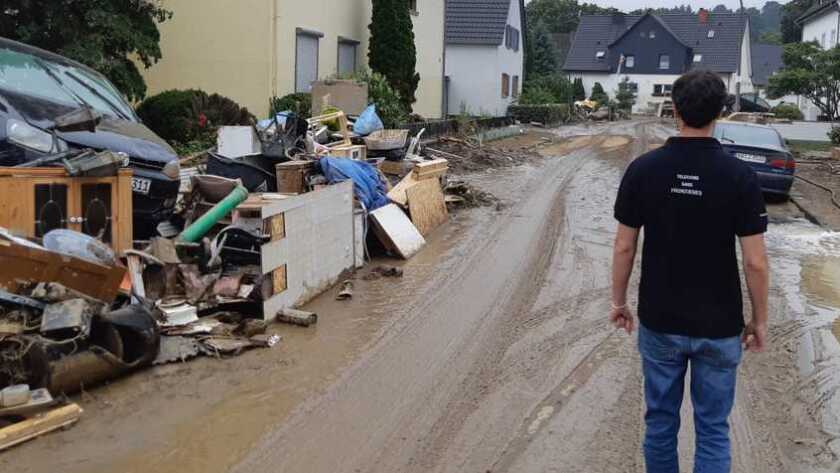As extreme weather reports continue to make the headlines, from the heatwaves in Canada to the floods in China and Germany, the critical work of first responders and humanitarian organisations becomes increasingly high profile. These are the people that come to the front line in a crisis, saving lives and supporting communities.
They are the foundation of public protection and disaster relief operations – many work for charities or are volunteers. We are fortunate to live in a highly connected world, and mobile phone networks and the internet are invaluable in times of both natural and man-made disasters, providing vital means of communication for communities and supporting the social media channels that have become so essential in terms of information exchange. But what happens when major events take down the networks – and connections are lost?
A key support organisation in these scenarios is Télécoms Sans Frontières (TSF). Being unable to contact family and friends adds immeasurable stress to a disaster situation, and a lack of commercial networks also hampers first responders in the search for missing people.
Supporting emergency responders
TSF assisted emergency responders during the July floods that hit Germany – which killed at least 180 people, with many others still missing at the time of writing.
The torrential rains caused some of the worst flooding to have hit several regions in the West of Germany, Belgium and the Netherlands, with thousands of people forced to leave their homes. Communications channels and power supplies were badly affected, with internet, mobile phone and electricity networks offline. It was extremely difficult for the relief organisations to contact those affected, and search for missing people. The situation was most serious in the North Rhine-Westphalia and Rhineland-Palatinate regions, where several villages and towns were flooded and neighbourhoods destroyed.
TSF deployed teams to two of the highest priority areas: the Ahrweiler district and the town of Euskirchen. In Ahrweiler, satellite lines were provided to aid communications for the local firefighters and all the other emergency responders, including the Federal Agency for Technical Relief (THW), who were rescuing people in areas where the mobile networks were out of action. THW is a cornerstone of civil protection in Germany, known for providing rapid technical relief in emergencies, natural disasters and accidents. They undertake work such as pumping out flooded basements, clearing fallen trees from roads, and making safe damaged buildings at risk of collapse.
The more reliable and more available the communications networks, the better these critical organisations can aid the stricken areas. In Euskirchen, TSF installed a broadband satellite connection in the local office of the Red Cross to support their emergency operations. Satellite lines – small and easily transportable – can establish telephone conversations from anywhere in the world. TSF maintains a fleet of satellite terminals and phones that can be deployed to support co-ordinators dealing with crisis situations.
Portable networks to restore communications
We take for granted today that connectivity will be available – it is essential now for so many areas of our lives, from keeping in touch with friends and family, for social media interaction, for online banking and financial services, connected healthcare and remote education services, as well as fuelling the IoT and smart manufacturing processes – to name just a few.
Depending on the type of crisis, and especially in highly vulnerable areas, these GSM-based communications infrastructures can be partially or completely destroyed, with only the dedicated emergency services networks in operation. These networks include features such as direct mode operation, which enables users to communicate radio to radio if the network infrastructure is damaged.
TSF’s support for disaster-hit areas includes the deployment of different types of solutions, which are selected depending on the needs identified on the ground. They can include the use of satellite lines or the installation of a range of mobile or fix broadband Internet connectivity solutions that can be rapidly installed and connect isolated areas anywhere in the world. The experience acquired by TSF has allowed it to establish privileged relationships with manufacturers and service providers, thus helping to share the ever-changing needs of the humanitarian-relief community.
While connectivity is just one of a number of key components to aid crisis relief, being able to quickly restore it is instrumental in helping communities to access critical aid and resources, as well as communicate with family members or charities. And as the tragic events of the past months show, organisations such as TSF really do play a key role in mitigating the impact of disasters, helping lives and communities to be quickly rebuilt.





